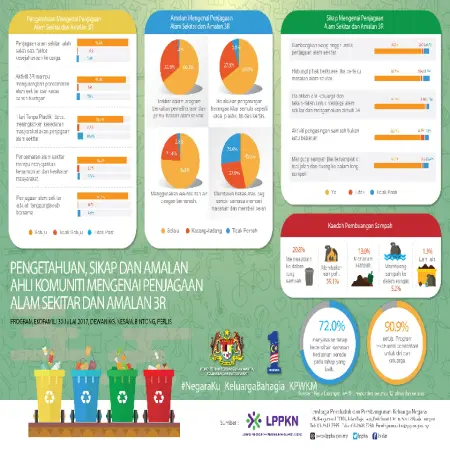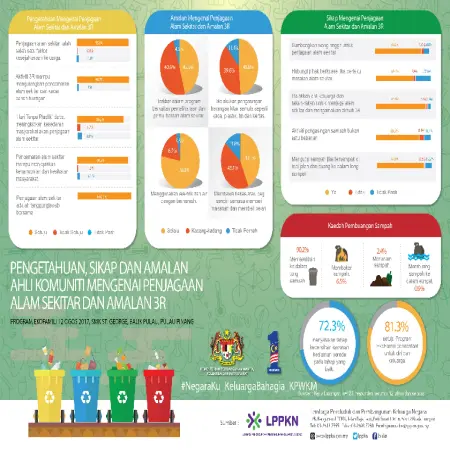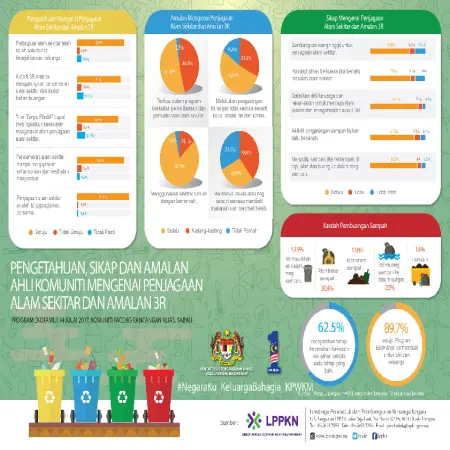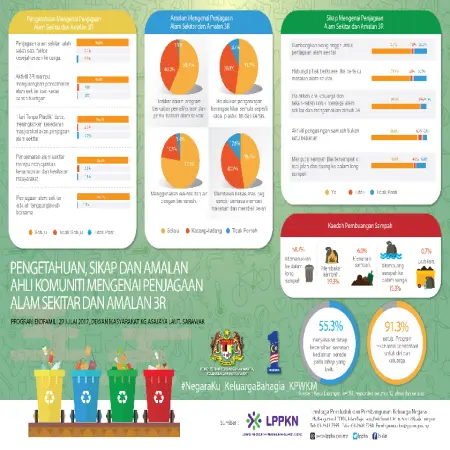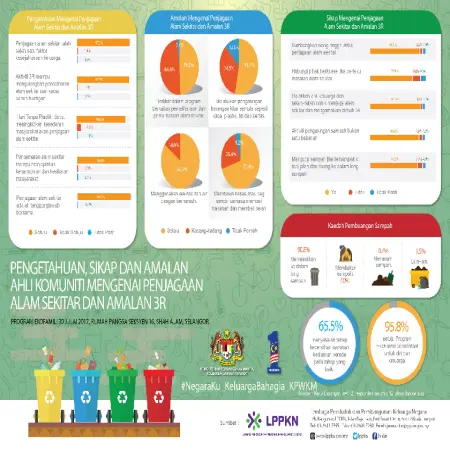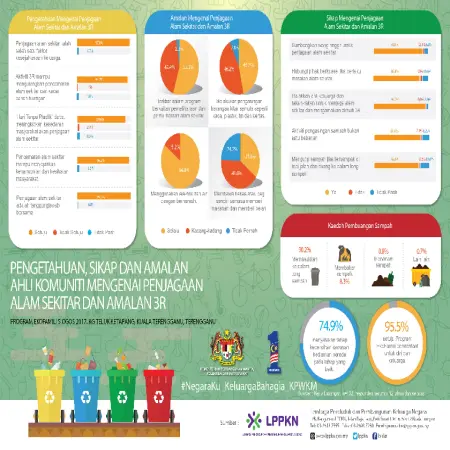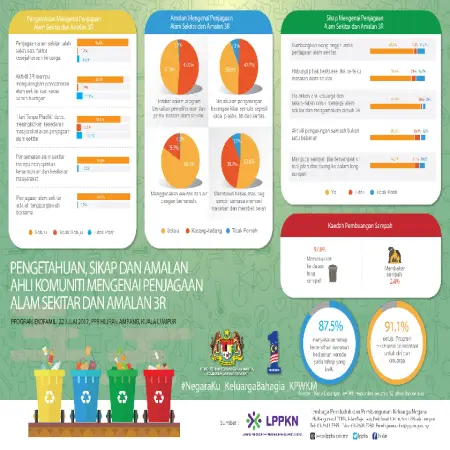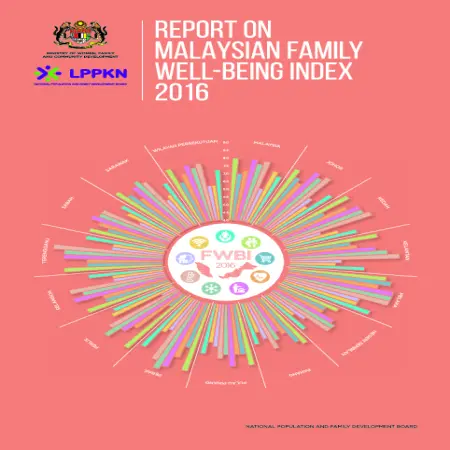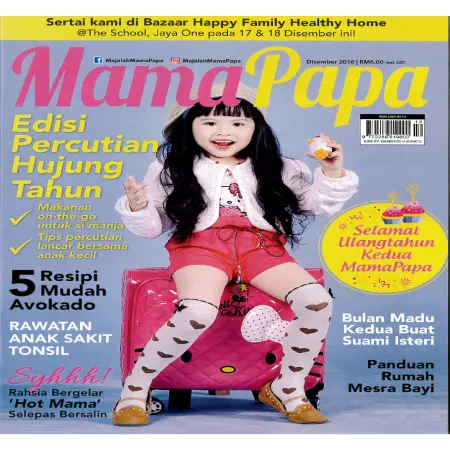TOPICS
|
|
Pengetahuan, sikap dan amalan ahli komuniti mengenai penjagaan alam sekitar dan amalan 3R di Perlis
Item Type: Infographic
Editor:
Year: 00/00/2017
Abstract: Findings of the opinion survey knowledge, attitudes and practices of community members on environmental care and 3R practices during eco family -programs in Perlis.
|
|
|
|
|
|
Pengetahuan, sikap dan amalan ahli komuniti mengenai penjagaan alam sekitar dan amalan 3R di Pulau Pinang
Item Type: Infographic
Editor:
Year: 00/00/2017
Abstract: Findings of the opinion survey knowledge, attitudes and practices of community members on environmental care and 3R practices during eco family-programs in Pulau Pinang
|
|
|
|
|
|
Pengetahuan, sikap dan amalan ahli komuniti mengenai penjagaan alam sekitar dan amalan 3R di Sabah
Item Type: Infographic
Editor:
Year: 00/00/2017
Abstract: Findings of the opinion survey knowledge, attitudes and practices of community members on environmental care and 3R practices during eco family-programs in Sabah
|
|
|
|
|
|
Pengetahuan, sikap dan amalan ahli komuniti mengenai penjagaan alam sekitar dan amalan 3R di Sarawak
Item Type: Infographic
Editor:
Year: 00/00/2017
Abstract: Findings of the opinion survey knowledge, attitudes and practices of community members on environmental care and 3R practices during eco family -programs in Sarawak
|
|
|
|
|
|
Pengetahuan,sikap dan amalan ahli komuniti mengenai penjagaan alam sekitar dan amalan 3R di Selangor
Item Type: Infographic
Editor:
Year: 00/00/2017
Abstract: Findings of the opinion survey knowledge, attitudes and practices of community members on environmental care and 3R practices during eco family -programs in Selangor
|
|
|
|
|
|
Pengetahuan, sikap dan amalan ahli komuniti mengenai penjagaan alam sekitar dan amalan 3R di Terengganu
Item Type: Infographic
Editor:
Year: 00/00/2017
Abstract: Findings of the opinion survey knowledge, attitudes and practices of community members on environmental care and 3R practices during eco family -programs in Terengganu
|
|
|
|
|
|
Pengetahuan, sikap dan amalan ahli komuniti mengenai penjagaan alam sekitar dan amalan 3R di Kuala Lumpur
Item Type: Infographic
Editor:
Year: 00/00/2017
Abstract: Findings of the opinion survey knowledge, attitudes and practices of community members on environmental care and 3R practices during eco family -programs in Kuala Lumpur
|
|
|
|
|
|
Report on Malaysian Family Well-Being Index 2016
Item Type: Research Report
Editor:
Year: 00/00/2017
Abstract: The NPFDB (2011) defined family well-being as a safe, healthy, comfortable, harmonious and satisfying family condition. This definition covers various aspects, such as spiritual satisfaction and comfort in respect of their economy and finance; mental, psychosocial, and health; political: and sustainability. Family Well-Being Index (FWBI) 2016 measured the level of family well-being through a household's assessment by the father or mother regarding the well-being of their families. This index examined the level of well-being in terms of family relationships, family economy, family relationships, family economy, family health, family safety, family and community involvement, religious and spiritual practices, housing and the environment, and family and communications technologies in the country. The overall FWBI 2016 score was 7.33 out of a maximum score of 10.
|
|
|
|
|
|
The 50th session of the Commission on Population and Development: general debate on changing population age structures and sustainable development
Item Type: Country Statement
Editor:
Year: 00/00/2017
Abstract: This Country Statement address about four important sub-topics namely changing population age structures, fertility trends and initiatives, adolescents and youth as well as trends in working age population.
|
|
|
|
|
|
Semarakkan cinta dengan bulan madu
Item Type: Article
Editor:
Year: 00/12/2016
Abstract: The option of having a second honeymoon at a late age of marriage may be something to consider. A second honeymoon is very important for every couple to improve the quality of family life. Couples can talk heart to heart a string of marital life journeys.
|
|
|
|





